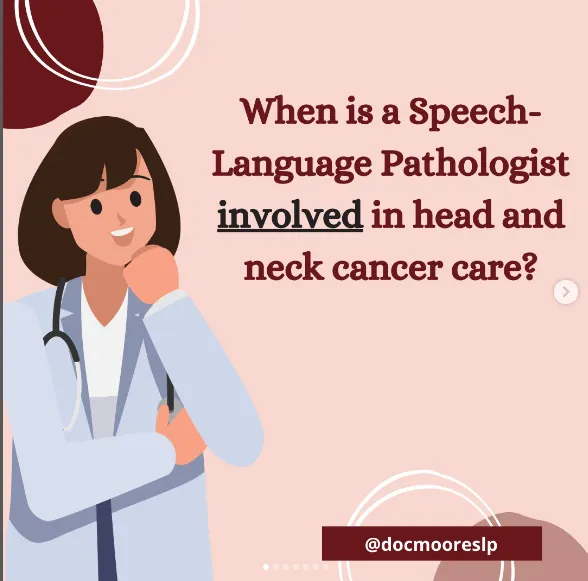Did you know that speech-language pathologists (SLPs) play a crucial role in the early diagnosis of head and neck cancer?
Before radiation or surgery, SLPs may perform baseline evaluations for communication and swallowing to identify any potential current issues and identify any potential issues that may arise during medical treatment. This allows for early intervention and preventative measures.
Education
SLPs provide education on strategies to optimize communication and swallowing function, as well as prophylactic exercises to maintain strength and range of motion in the head and neck muscles.
Early intervention, education, and prophylactic exercises can lead to better outcomes, such as less dependency on alternative means of nutrition, for head and neck cancer patients.
During Hospitalization
Speech-language pathologists play an important role in the treatment of head and neck cancer patients during their hospitalization for radiation and/or surgery. During hospitalization, SLPs work closely with patients to help them maintain their communication & swallowing abilities during & after their acute treatment. They provide comprehensive assessments to identify any changes in the patient’s communication and swallowing functions, & develop personalized therapy plans to address those changes.
Swallow Test
The clinical swallow examination is a non-invasive evaluation that assesses the patient’s swallowing function through observation and physical examination. The exam includes an evaluation of the oral cavity, throat, and neck muscles involved in the swallowing process along with various food and liquid trials.
The Modified Barium Swallow is a radiologic exam that evaluates the patient’s swallowing function while they swallow different types of food and liquids mixed with barium. The exam assesses the patient’s ability to swallow safely and efficiently. Our goal is to help prevent food or liquid entering the lungs, and identify any difficulties or abnormalities in the swallowing process.
Scoping It Out
The Flexible Endoscopic Evaluation of Swallow is a procedure that uses a flexible endoscope inserted through the patient’s nose to assess the swallowing function. The exam provides a detailed view of the patient’s upper airway and swallowing structures during the swallowing process, allowing the SLP to identify any abnormalities or difficulties.
Videostroboscopy is a procedure that uses a flexible endoscope with a small camera attached to evaluate the patient’s vocal cords and surrounding tissues during speech production. We may evaluate communication concerns at bedside as well.
These assessments are crucial in reducing the patient’s risk of developing aspiration pneumonia, malnutrition, & to reduce difficulty communicating during and after treatment. SLPs can develop personalized therapy plans that address the patient’s needs and improve their overall quality of life.
After Radiation
After radiation treatment, chemo-therapy, and/or surgery in head and neck cancer, Speech-Language Pathologists evaluate changes in communication and swallowing abilities and create a personalized rehabilitation plans. We focus on treating dysarthria (difficulty speaking), dysphonia (changes in voice), and dysphagia (difficulty swallowing).
We often want a fresh look at swallowing capabilities on an outpatient basis and will often recommend an instrumental assessment of swallowing such as an x-ray (MBSS) or a scope (FEES). After the examination a custom therapy plan will be created. We may use a variety of techniques to aid in rehabilitation such as myofascial release or manual lymphatic drainage to reduce pain, inflammation, and to improve range of motion in the swallowing muscles. We may also use traditional swallowing exercises to improve strength and coordination.
For individuals who have difficulty speaking, we will help determine if this is a problem with your voice or other articulators. We will often partner with ENTs, oromaxillary surgeons, or prosthodontists during the recovery process. We may introduce AAC options such as communication boards, speech-generating devices, or even an electrolarynx.
In Conclusion
Find a qualified SLP for rehabilitation to restore communication and swallowing abilities!

